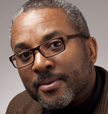Everyone has been talking about mothers having the talk with their sons. But I haven’t heard enough about us -- fathers, black men -- having that conversation with our sons.
Unlike our sisters, wives, mothers and daughters, we -- black men -- have been there. We know what it’s like. We’ve walked in those shoes. Time taught us tact, but we won’t live long enough to outgrow the frustration and the bitterness.
We’ve lived through it over and over again:
The first time we were stopped for driving a nice car.
The first time the cashier asked for ID even though the white person in front of us wasn’t ask to produce one.
The first time we were unlucky enough to be in the neighborhood where a crime was committed.
Remember Susan Smith and her two dead sons? Her story was so easy to believe. Just blame a black man. When President Obama said if he had a son he’d look like Trayvon Martin, we know exactly what he’s talking about.
We’ve heard the 9-11 audio tape. We’ve also heard the lawyers, parents and pundits. While the details of what happened in Sanford on Feb. 26 are in dispute, no one can deny this fact: A black man who shoots a 17-year-old white youth armed with nothing more than a soda bottle and candy and claims self-defense does not get the benefit of the doubt.
For him, Stand Your Ground isn’t law, but quicksand. He gets dragged down to police headquarters to explain what happened in detail. If any inconsistencies creep into his story, the handcuffs come out; he stays in jail.
But to the Sanford police department, the scene was easy to explain. A young black man dressed in a hood lies on the ground dead. The Neighborhood Watch captain says he felt threatened. Of course, it makes sense.
Before I proceed further, a word of caution. While outrage is appropriate, we can’t afford to go overboard. Too many young black men die at the hands of fellow black men: an insult; an unintended diss; an inadvertent shoulder bump; a drug deal gone wrong. Sadly, we hear too little outrage for the countless black men whose blood stains our sidewalks. We shed no tears for the guilty, the culpable.
But what happened to Trayvon is a reminder of the random death that stalks our sons, brothers, nephews, grandsons – the innocents -- us.
Which is why this conversation is so hard for us. We can’t begin without getting angry all over again. We can’t finish before the long buried frustrations resurface.
We wish we could promise our sons it won’t happen anymore. We wish we could guarantee that if they dress right, talk right, walk right and look right, it will inoculate them against this kind of thing, but we can’t. We can only tell them too many factors are beyond their control. Too many stereotypes to undo. Too many George Zimmermans who will only see them.
So what does a father say?
What does he honestly say when he knows in his heart that even though his walls are decorated with academic degrees, even though he lives in a gated community, even though he has the nicest car on the block, he knows he’s only one dark night removed from the next affront, from the next time he stares down the barrel of a 9 millimeter pistol, knowing that none of his achievement or affluence will mean anything. But a father can’t tell his son that.
Andrew Skerritt is an assistant professor of journalism at Florida A&M University and the author of Ashamed to Die: Silence, Denial and the AIDS Epidemic in the South. He can be reached at [email protected]
© Florida Voices








Add comment